Many Faces
The Many Faces Of The Justice League (2017 Update)
Russ Dimino takes a look back at the various media incarnations of the Justice League.
Published
7 years agoon
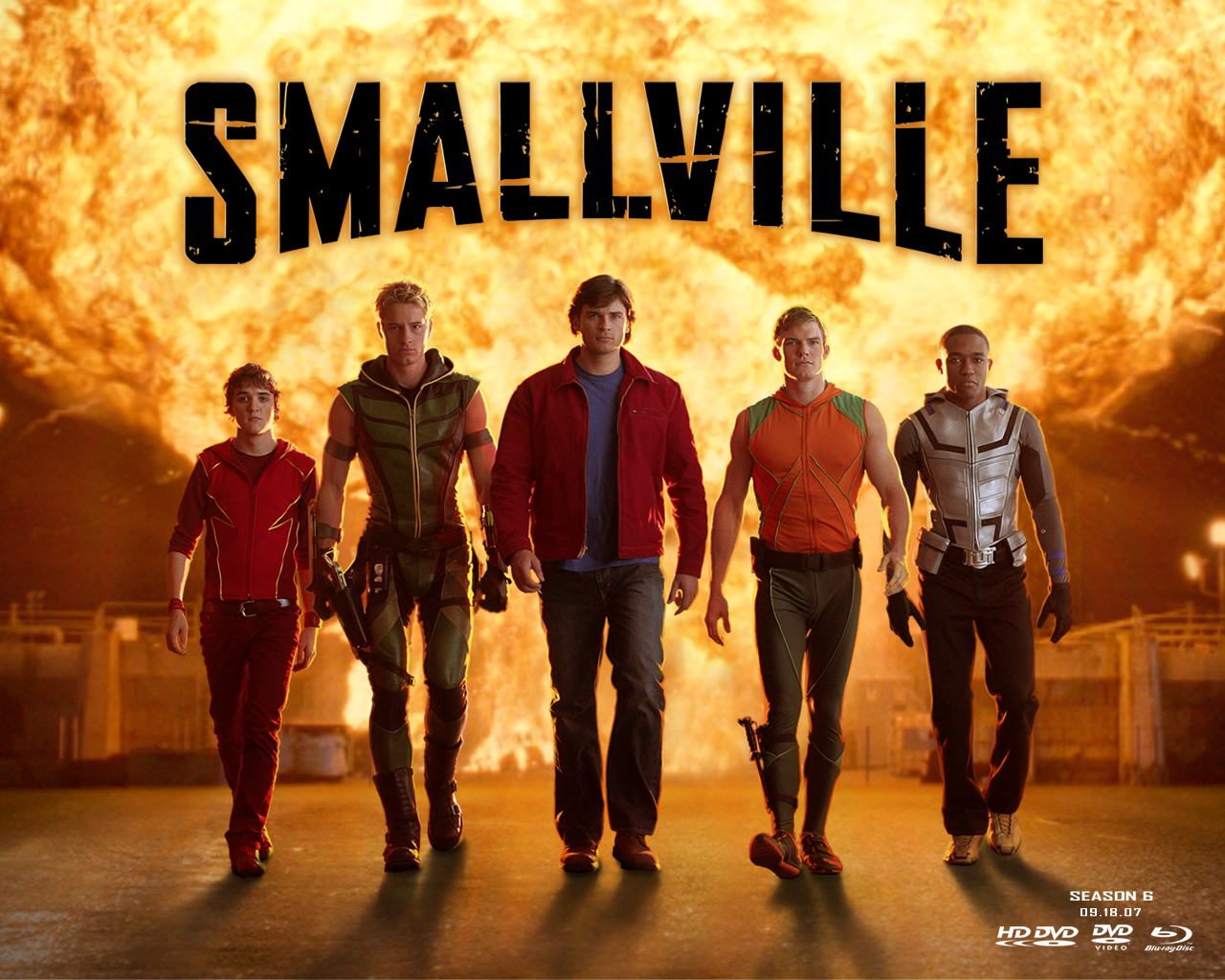
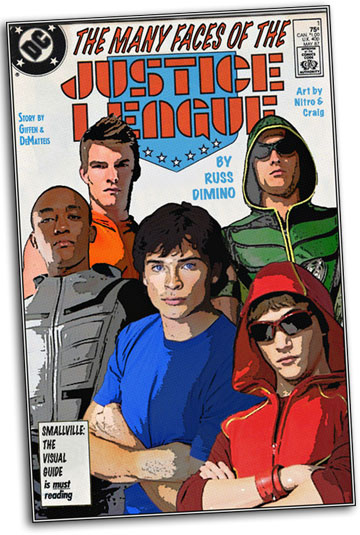 The man of steel. The world’s greatest detective. An Amazonian warrior princess. The fastest man alive. The king of Atlantis. A Cyborg. These are but a few of the members of a group whose ranks define the elite of the world’s superhero community. Separately, they have saved the world countless times over. Occasionally, however, a threat emerges that is so huge that they have no choice but to band together and combine their forces. Together, they are the Justice League.
The man of steel. The world’s greatest detective. An Amazonian warrior princess. The fastest man alive. The king of Atlantis. A Cyborg. These are but a few of the members of a group whose ranks define the elite of the world’s superhero community. Separately, they have saved the world countless times over. Occasionally, however, a threat emerges that is so huge that they have no choice but to band together and combine their forces. Together, they are the Justice League.
The League first appeared in the comics in The Brave and The Bold #28, which hit stands in 1960. The initial line-up was Superman, Batman, Wonder Woman, The Flash, Aquaman, Green Lantern, and J’onn J’onzz, a.k.a. The Martian Manhunter. This issue also introduced the team’s teen sidekick/mascot, Snapper Carr. The League got their own series in 1961, with members constantly being added or replaced throughout its long history. Over the years, other chapters of the League popped up, such as Justice League Europe, Justice League International, and Justice League Task Force.
The League flew into the Saturday morning line-up in 1973 with “The Super Friends.” The series was produced by Hanna-Barbera, the company behind “Scooby Doo,” “The Flintstones,” “The Jetsons,” and many other classic cartoons. The title “Super Friends” was seen as a more kid-friendly than “Justice League,” though the team was still sometimes referred to as such on the show. “Super Friends” was a hit, and would stick around until 1986, going through many changes and revamps as it went along.
The roster for the first season of “Super Friends” consisted of Danny Dark as Superman, Olan Soule as Batman, radio legend Casey Kasem as Robin, Shannon Farnon as Wonder Woman, and Norman Alden as Aquaman. To increase the kid-appeal, the team also included two teenagers, Wendy and Marvin, and their talking dog, Wonder Dog. They had no powers, except, of course, Wonder Dog’s ability to talk, which was never really addressed or explained. Wendy was voiced by Sherry Alberoni, and Frank Welker voiced both Marvin and Wonder Dog. The series was narrated by Ted Knight, best known as Ted Baxter of “Mary Tyler Moore” fame.
Episodes of the first season repeated until 1977, when “The All New Super Friends Hour” debuted. This season saw the addition of Jack Angel as Flash and Hawkman, and Michael Rye as Apache Chief and Green Lantern. Gone were Wendy, Marvin, and Wonder Dog. In were the Wonder Twins, Jayna and Zan, who had the power to shapeshift into animal and water forms, respectively. Liberty Williams voiced Jayna, and Michael Bell voiced Zan. William Woodson replaced Ted Knight as the narrator (ironically, Woodson was in the “Mary Tyler Moore” episode “And Now, Sitting in for Ted Baxter”!).
The most popular season among the fans came in 1978 with “Challenge of the Super Friends.” Not only had the quality of the animation improved by this point, but the Friends now faced The Legion of Doom, a group of villains who had formed a league of their own, so to speak. The Legion of Doom was made up of 13 villains whose ranks included Lex Luthor, Solomon Grundy, Toyman, Riddler, Bizarro, the Scarecrow, and Brainiac (played by Ted Cassidy, “Lurch” of “Addams Family” fame), to name a few. Also this season, Bill Calloway took over the role of Aquaman from Norman Alden.
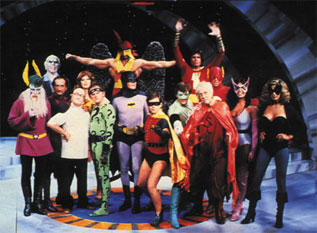 In 1979, the League made a live-action appearance of sorts. In the TV special “Legends of the Superheroes,” the heroes took part in both a superhero adventure and a celebrity roast. The stars of this campy, tongue-in-cheek show were Adam West and Burt Ward, who reprised their roles as Batman and Robin from the hit 1960’s “Batman” TV series. Rounding out the rest of the group were Garrett Craig as Captain Marvel, Howard Murphy as Green Lantern, Danuta Rylko Soderman as Black Canary, Bill Nuckols as Hawkman, Rod Haase as Flash, Barbara Joyce as Huntress and Alfie Wise as The Atom. They went up against villains such as Charlie Callas as Sinestro, Gabe Dell as Mordru, Howard Morris as Dr. Sivana, Mickey Morton as Solomon Grundy, A’leisha Brevard as Giganta, Ruth Buzzie as Auntie Minerva, and, also reprising his “Batman” role, Frank Gorshin as the Riddler. Gary Owens provided narration, and none other than Ed McMahon was the Master of Ceremonies at the roast. Appearances by Hawkman’s mom and a geriatric hero called Retired Man added to the silliness of this strange program. For many years this special was only available to fans in bootleg format at comic book conventions, but it did finally get an official DVD release a few years ago.
In 1979, the League made a live-action appearance of sorts. In the TV special “Legends of the Superheroes,” the heroes took part in both a superhero adventure and a celebrity roast. The stars of this campy, tongue-in-cheek show were Adam West and Burt Ward, who reprised their roles as Batman and Robin from the hit 1960’s “Batman” TV series. Rounding out the rest of the group were Garrett Craig as Captain Marvel, Howard Murphy as Green Lantern, Danuta Rylko Soderman as Black Canary, Bill Nuckols as Hawkman, Rod Haase as Flash, Barbara Joyce as Huntress and Alfie Wise as The Atom. They went up against villains such as Charlie Callas as Sinestro, Gabe Dell as Mordru, Howard Morris as Dr. Sivana, Mickey Morton as Solomon Grundy, A’leisha Brevard as Giganta, Ruth Buzzie as Auntie Minerva, and, also reprising his “Batman” role, Frank Gorshin as the Riddler. Gary Owens provided narration, and none other than Ed McMahon was the Master of Ceremonies at the roast. Appearances by Hawkman’s mom and a geriatric hero called Retired Man added to the silliness of this strange program. For many years this special was only available to fans in bootleg format at comic book conventions, but it did finally get an official DVD release a few years ago.
In 1984, “Super Friends” was back with another new incarnation, this time called “Super Friends: The Legendary Super Powers Show.” This time out, the team had help from Firestorm the Nuclear Man, voiced by Mark L. Taylor. Adam West now provided the voice of Batman, taking over for Olan Soule. Despite the casting of the classically campy Batman actor, the show started to take on a more serious tone, with the Friends now fighting darker villains like Darkseid and his warriors from the planet Apokolips. Some other cast changes: Constance Cawfield now voiced Wonder Woman, and B.J. Ward voiced Jayna.
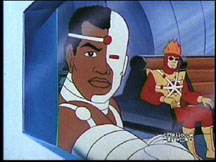 The final season of “Super Friends” came in 1985 with “Super Powers Team: Galactic Guardians.” This season saw the addition of Ernie Hudson of “Ghostbusters” fame as Victor Stone, a.k.a. Cyborg. B.J. Ward now stepped up the ranks, voicing Wonder Woman. This version continued the darker trend that the series had been taking, marking the first time that Batman’s grim origin (namely having his parents gunned down in front of him as a young boy) was ever depicted outside of the comics.
The final season of “Super Friends” came in 1985 with “Super Powers Team: Galactic Guardians.” This season saw the addition of Ernie Hudson of “Ghostbusters” fame as Victor Stone, a.k.a. Cyborg. B.J. Ward now stepped up the ranks, voicing Wonder Woman. This version continued the darker trend that the series had been taking, marking the first time that Batman’s grim origin (namely having his parents gunned down in front of him as a young boy) was ever depicted outside of the comics.
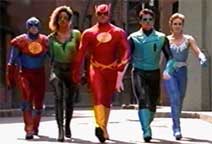 In 1997, the League tried and failed to make a jump to a live-action TV series. A pilot that never aired in the US was produced and, much like “Legends of the Superheroes” used to be, is now pretty much exclusive to the comic convention bargain bins (and possibly YouTube). This version starred Matthew Settle as Green Lantern, Kimberly Oja as Ice, John Kassir as The Atom, Michelle Hurd as Fire, Kenny Johnston as The Flash, and David Ogden Stiers as Martian Manhunter J’onn J’onzz. The villain in this tale? The late Miguel Ferrer as Dr. Eno, The Weather Wizard, who holds the city for ransom with the threat of a tidal wave. Ferrer voiced another version of this same character in an episode of the animated “Superman” series, “Speed Demons,” in which Superman teamed up with The Flash.
In 1997, the League tried and failed to make a jump to a live-action TV series. A pilot that never aired in the US was produced and, much like “Legends of the Superheroes” used to be, is now pretty much exclusive to the comic convention bargain bins (and possibly YouTube). This version starred Matthew Settle as Green Lantern, Kimberly Oja as Ice, John Kassir as The Atom, Michelle Hurd as Fire, Kenny Johnston as The Flash, and David Ogden Stiers as Martian Manhunter J’onn J’onzz. The villain in this tale? The late Miguel Ferrer as Dr. Eno, The Weather Wizard, who holds the city for ransom with the threat of a tidal wave. Ferrer voiced another version of this same character in an episode of the animated “Superman” series, “Speed Demons,” in which Superman teamed up with The Flash.
A futuristic version of the League known as the Justice League Unlimited, or JLU, made an appearance in a two-part episode of “Batman Beyond” in 2000. This incarnation included Superman (Christopher McDonald), Big Barda (Farrah Forke), Aquagirl (Jodi Benson), Warhawk (Peter Onorati), and a young Tibetan Green Lantern named Kai-Ro (Lauren Tom). Terry McGinnis (Will Friedle) assisted the League in weeding out a traitor in their midst. This two-part episode was in many ways a test run for the “Justice League” series that followed it in 2001.
 The new “Justice League” series was produced by the award-winning team behind the “Batman” and “Superman” animated shows of the 1990s, and was in fact spun-off from the continuity of those shows. Kevin Conroy, who had voiced Batman since 1992, continued to voice the Dark Knight. George Newbern stepped up to the role of Superman, since Tim Daly, who had previously voiced Supes, was busy with the new “Fugitive” TV series. The rest of the League was comprised of Susan Eisenberg as Wonder Woman, Carl Lumbly (Dixon on “Alias” and M’yrnn J’onzz on the current “Supergirl” series) as J’onn J’onzz, Maria Canals as Hawkgirl, “MAD TV” alum Phil LaMarr as Green Lantern, and “Smallville” star Michael Rosenbaum as The Flash. The League’s original sidekick from their comic book debut, Snapper Carr, even made scattered appearances throughout the series, this time as a TV reporter. He was voiced by Jason Marsden.
The new “Justice League” series was produced by the award-winning team behind the “Batman” and “Superman” animated shows of the 1990s, and was in fact spun-off from the continuity of those shows. Kevin Conroy, who had voiced Batman since 1992, continued to voice the Dark Knight. George Newbern stepped up to the role of Superman, since Tim Daly, who had previously voiced Supes, was busy with the new “Fugitive” TV series. The rest of the League was comprised of Susan Eisenberg as Wonder Woman, Carl Lumbly (Dixon on “Alias” and M’yrnn J’onzz on the current “Supergirl” series) as J’onn J’onzz, Maria Canals as Hawkgirl, “MAD TV” alum Phil LaMarr as Green Lantern, and “Smallville” star Michael Rosenbaum as The Flash. The League’s original sidekick from their comic book debut, Snapper Carr, even made scattered appearances throughout the series, this time as a TV reporter. He was voiced by Jason Marsden.
In 2004, the “Justice League” series evolved into “Justice League Unlimited.” The League opened its doors to all superheroes in the DC Universe, expanding its ranks from the original seven to include around 60 heroes in all. To name a few, Kin Shriner as Green Arrow, Nicholle Tom as Supergirl, Jeffrey Combs as The Question, Chris Cox as Captain Atom, Scott Rummell as Aquaman, Oded Fehr (the “Mummy” movies) as Dr. Fate, and Ron Perlman as Orion joined up with the expanded League. “The Wonder Years” stars Fred Savage and Jason Hervey were reunited on the show as the superhero team Hawk and Dove.
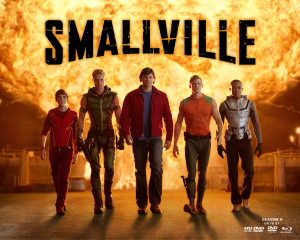 “Smallville” had the luxury of slowly building up the concept of the Justice League throughout its ten-season run. Individual heroes made scattered solo appearances throughout the early seasons of the show, including Kyle Gallner as Bart Allen/Impulse, Alan Ritchson as Arthur Curry/Aquaman, the late Lee Thompson Young as Victor Stone/Cyborg, and a pre-“This Is Us” Justin Hartley was even a series regular for a time as Oliver Queen/Green Arrow. These appearances were usually accompanied by some sort of allusion to the idea of the heroes someday forming a team. These references finally paid off in the sixth season episode “Justice,” wherein the aforementioned guest-starring heroes all joined forces with Clark to take down one of Lex Luthor’s clandestine operations.
“Smallville” had the luxury of slowly building up the concept of the Justice League throughout its ten-season run. Individual heroes made scattered solo appearances throughout the early seasons of the show, including Kyle Gallner as Bart Allen/Impulse, Alan Ritchson as Arthur Curry/Aquaman, the late Lee Thompson Young as Victor Stone/Cyborg, and a pre-“This Is Us” Justin Hartley was even a series regular for a time as Oliver Queen/Green Arrow. These appearances were usually accompanied by some sort of allusion to the idea of the heroes someday forming a team. These references finally paid off in the sixth season episode “Justice,” wherein the aforementioned guest-starring heroes all joined forces with Clark to take down one of Lex Luthor’s clandestine operations.
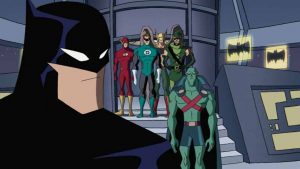 The 2004 animated series “The Batman” initially focused on the early adventures of a caped crusader who was relatively new to his role as a crime fighter. As the series went on, its horizons broadened to include a wider DC universe as Batman began to cross paths with other heroes. The two-part finale to season four saw Batman joining up with the Martian Manhunter (voiced by Dorian Harewood; no relation we are aware of to David Harewood who would play the character on “Supergirl”) to take on an alien collective called The Joining. This led to Batman’s introduction to a Justice League that would continue to appear throughout the fifth season, which included Hawkman (Robert Patrick), Green Arrow (Chris Hardwick), Green Lantern (Durmot Mulroney), and the Flash (Charlie Schlatter).
The 2004 animated series “The Batman” initially focused on the early adventures of a caped crusader who was relatively new to his role as a crime fighter. As the series went on, its horizons broadened to include a wider DC universe as Batman began to cross paths with other heroes. The two-part finale to season four saw Batman joining up with the Martian Manhunter (voiced by Dorian Harewood; no relation we are aware of to David Harewood who would play the character on “Supergirl”) to take on an alien collective called The Joining. This led to Batman’s introduction to a Justice League that would continue to appear throughout the fifth season, which included Hawkman (Robert Patrick), Green Arrow (Chris Hardwick), Green Lantern (Durmot Mulroney), and the Flash (Charlie Schlatter).
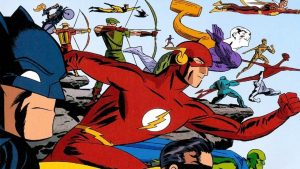 Beginning in 2007, DC began releasing direct-to-video animated original movies, many of which were based on popular comic book storylines. Titles that centered around various incarnations of the League included “Justice League: The New Frontier,” based on the miniseries by Darwyn Cooke; “Justice League: Crisis on Two Earths,” in which the League encountered parallel versions of themselves known as the Crime Syndicate; “Justice League: Doom,” based on Mark Waid’s popular “Tower of Babel” storyline; “Justice League: The Flashpoint Paradox,” where a time-traveling Flash accidentally altered reality for the worse; “Justice League: War,” an adaptation of the first “New 52” reboot era storyline that revisited the origin of the League; “Justice League: Throne of Atlantis,” which explored Aquaman’s heritage; “Justice League: Gods and Monsters,” which offered a grim take on Superman, Batman, and Wonder Woman; “Justice League vs. Teen Titans,” which saw many established heroes throwing down with their junior sidekicks; and “Justice League Dark,” in which Batman assembled a black ops version of the League to deal with supernatural threats.
Beginning in 2007, DC began releasing direct-to-video animated original movies, many of which were based on popular comic book storylines. Titles that centered around various incarnations of the League included “Justice League: The New Frontier,” based on the miniseries by Darwyn Cooke; “Justice League: Crisis on Two Earths,” in which the League encountered parallel versions of themselves known as the Crime Syndicate; “Justice League: Doom,” based on Mark Waid’s popular “Tower of Babel” storyline; “Justice League: The Flashpoint Paradox,” where a time-traveling Flash accidentally altered reality for the worse; “Justice League: War,” an adaptation of the first “New 52” reboot era storyline that revisited the origin of the League; “Justice League: Throne of Atlantis,” which explored Aquaman’s heritage; “Justice League: Gods and Monsters,” which offered a grim take on Superman, Batman, and Wonder Woman; “Justice League vs. Teen Titans,” which saw many established heroes throwing down with their junior sidekicks; and “Justice League Dark,” in which Batman assembled a black ops version of the League to deal with supernatural threats.
The 2008 animated series “Batman: The Brave and the Bold” specifically revolved around Batman teaming up with other superheroes, so it’s no surprise that a version of the Justice League would be included. A flashback sequence in the season two episode “Sidekicks Assemble!” established the existence of a previous Justice League consisting of Black Canary, Martian Manhunter, Aquaman, the Flash, Wonder Woman, and the Hal Jordan Green Lantern. Later that season, in the episode “Darkseid Descending!”, Batman (Diedrich Bader) assembled a new Justice League International that reunited original members Martian Manhunter (Nicholas Guest) and Aquaman (John DiMaggio) and added new recruits Blue Beetle (Will Friedle), Booster Gold (Tom Everett Scott), Fire (Grey DeLisle), Ice (Jennifer Hale), and the Guy Gardner Green Lantern (James Arnold Taylor).
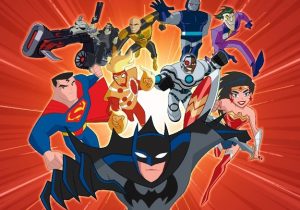 In 2016, “Justice League Action” became the latest animated incarnation of the League to hit the airwaves, debuting on Cartoon Network. The 15-minute episodes featured a rotating cast of heroes, and, as the title suggested, were very action-heavy and fast-paced. The veritable “Who’s Who” of heroes included ranged from the obvious household names like Superman (Jason J. Lewis), Wonder Woman (Rachel Kimsey), and Batman (Kevin Conroy once again), to characters like Red Tornado, Jonah Hex, Stargirl, John Constantine, Mister Terrific, Firestorm, Shazam, and Zatanna, to name just a handful.
In 2016, “Justice League Action” became the latest animated incarnation of the League to hit the airwaves, debuting on Cartoon Network. The 15-minute episodes featured a rotating cast of heroes, and, as the title suggested, were very action-heavy and fast-paced. The veritable “Who’s Who” of heroes included ranged from the obvious household names like Superman (Jason J. Lewis), Wonder Woman (Rachel Kimsey), and Batman (Kevin Conroy once again), to characters like Red Tornado, Jonah Hex, Stargirl, John Constantine, Mister Terrific, Firestorm, Shazam, and Zatanna, to name just a handful.
The Justice League made a brief appearance in “The Lego Batman Movie” in 2017. Batman (Will Arnett) went to the Fortress of Solitude to steal the Phantom Zone Projector from Superman (Channing Tatum), only to stumble upon the Justice League having their 57th Annual Anniversary Party without him.
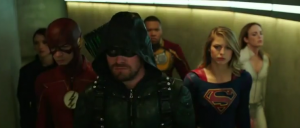 Over the past several years, DC has been slowly building an intricate live-action universe on the CW network. “Arrow,” “The Flash,” “Supergirl,” and “Legends of Tomorrow” all form an interconnected continuity where characters and storylines often spill over from one show to the other. The animated web-series “Vixen,” the upcoming animated web-series “Freedom Fighters: The Ray,” and even the cancelled NBC series “Constantine” also tie into this shared universe. Although the name “Justice League” has not been overtly used to describe the group of heroes (Gideon certainly seemed like she was about to say it in the “Flash” episode “The Trap”), it’s almost a foregone conclusion that they will ultimately form some variation of the team. Although the four main shows often interconnect in small, subtle ways, a full-blown crossover has become an annual tradition. This year’s crossover starts on Monday, November 27th, with “Supergirl” and “Arrow,” and continues on Tuesday, November 28th, with “The Flash” and “Legends of Tomorrow.”
Over the past several years, DC has been slowly building an intricate live-action universe on the CW network. “Arrow,” “The Flash,” “Supergirl,” and “Legends of Tomorrow” all form an interconnected continuity where characters and storylines often spill over from one show to the other. The animated web-series “Vixen,” the upcoming animated web-series “Freedom Fighters: The Ray,” and even the cancelled NBC series “Constantine” also tie into this shared universe. Although the name “Justice League” has not been overtly used to describe the group of heroes (Gideon certainly seemed like she was about to say it in the “Flash” episode “The Trap”), it’s almost a foregone conclusion that they will ultimately form some variation of the team. Although the four main shows often interconnect in small, subtle ways, a full-blown crossover has become an annual tradition. This year’s crossover starts on Monday, November 27th, with “Supergirl” and “Arrow,” and continues on Tuesday, November 28th, with “The Flash” and “Legends of Tomorrow.”
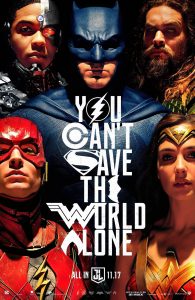 It seems hard to believe that with all of these colorful interpretations of the Justice League over the years, they have never been portrayed in live action on the big screen. This is finally about to change. The groundwork for the nascent cinematic Justice League was laid in the 2016 film “Batman v Superman: Dawn of Justice.” Although much of the film focused on the titular rivalry between Ben Affleck’s Dark Knight and Henry Cavill’s Man of Steel, fans were also introduced to Gal Gadot’s sensational Wonder Woman, and glimpsed teases of Aquaman (Jason Momoa), Flash (Ezra Miller), and Cyborg (Ray Fisher).
It seems hard to believe that with all of these colorful interpretations of the Justice League over the years, they have never been portrayed in live action on the big screen. This is finally about to change. The groundwork for the nascent cinematic Justice League was laid in the 2016 film “Batman v Superman: Dawn of Justice.” Although much of the film focused on the titular rivalry between Ben Affleck’s Dark Knight and Henry Cavill’s Man of Steel, fans were also introduced to Gal Gadot’s sensational Wonder Woman, and glimpsed teases of Aquaman (Jason Momoa), Flash (Ezra Miller), and Cyborg (Ray Fisher).
That setup comes to full fruition with “Justice League,” opening in theaters everywhere on November 17th, 2017. In order to combat an impending other-worldly threat, Batman (Affleck) and Wonder Woman (Gadot) begin assembling a team of heroes. Supporting characters from “Man of Steel,” “Batman v Superman,” and “Wonder Woman” are expected to appear in the film. A sequel is already being planned for a 2019 release, along with spin-off solo adventures for each member of the group. It seems safe to say that while this is the first big-screen adventure for the Justice League, it will be very far from their last.
Back in 2004, the first episode of “Justice League Unlimited” opened with Superman addressing the gathered heroes who were joining the expanded League. “Each of you brings something different to the table,” he told them. And therein lies the reason for the League itself. The powers and abilities possessed by the many members of the League range from flight, strength and speed to telepathy, shape-shifting, energy blasts and advanced weaponry. But it is not only their varied powers that makes the diversity of the League so important. They each have different approaches, thoughts and ideas about how to uphold their noble mission of bringing justice to the world. Batman may not always agree with Superman, and Wonder Woman may have very little in common with The Flash, but having another point of view on a difficult case can sometimes prove the key to solving it. And even the most powerful of heroes needs some backup once in awhile. Other times, though, it just comes down to the moral support of having some trusted teammates fighting by your side when the times get really tough. After all, now and then, we all need a little help from our friends.
You may like
-
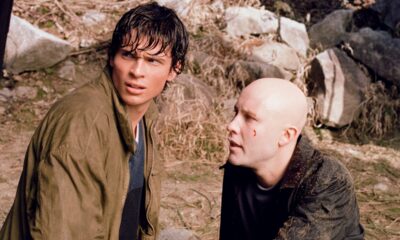

Revealed: Possible Smallville Cameos in James Gunn’s Superman!
-
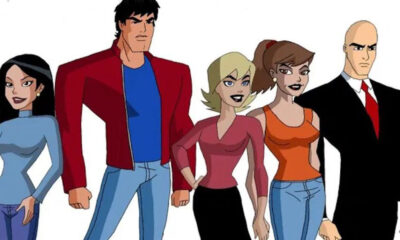

Smallville Animated Update: It May Be A While…
-
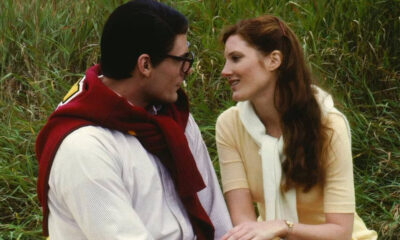

Annette O’Toole’s Big Smallville Regret
-
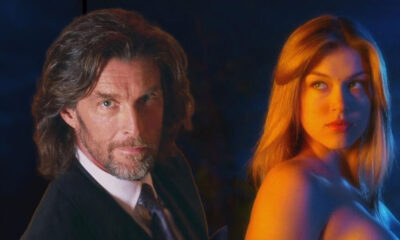

Two Guests Added for the Salute to Smallville 2025 Convention!
-
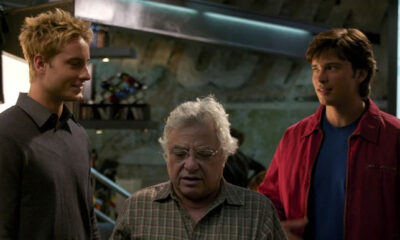

Beloved Smallville Director Passes Away
-
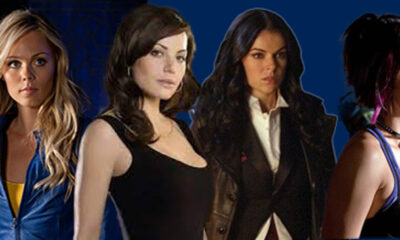

Smallville Almost Had A “Female Justice League” Episode
Lois & Clark
The Many Faces Of… Super-Finales!
As the series finale of Supergirl approaches, Russ Dimino looks back at Super-finales of the past, including Smallville, Superboy, Lois & Clark and more
Published
3 years agoon
November 9, 2021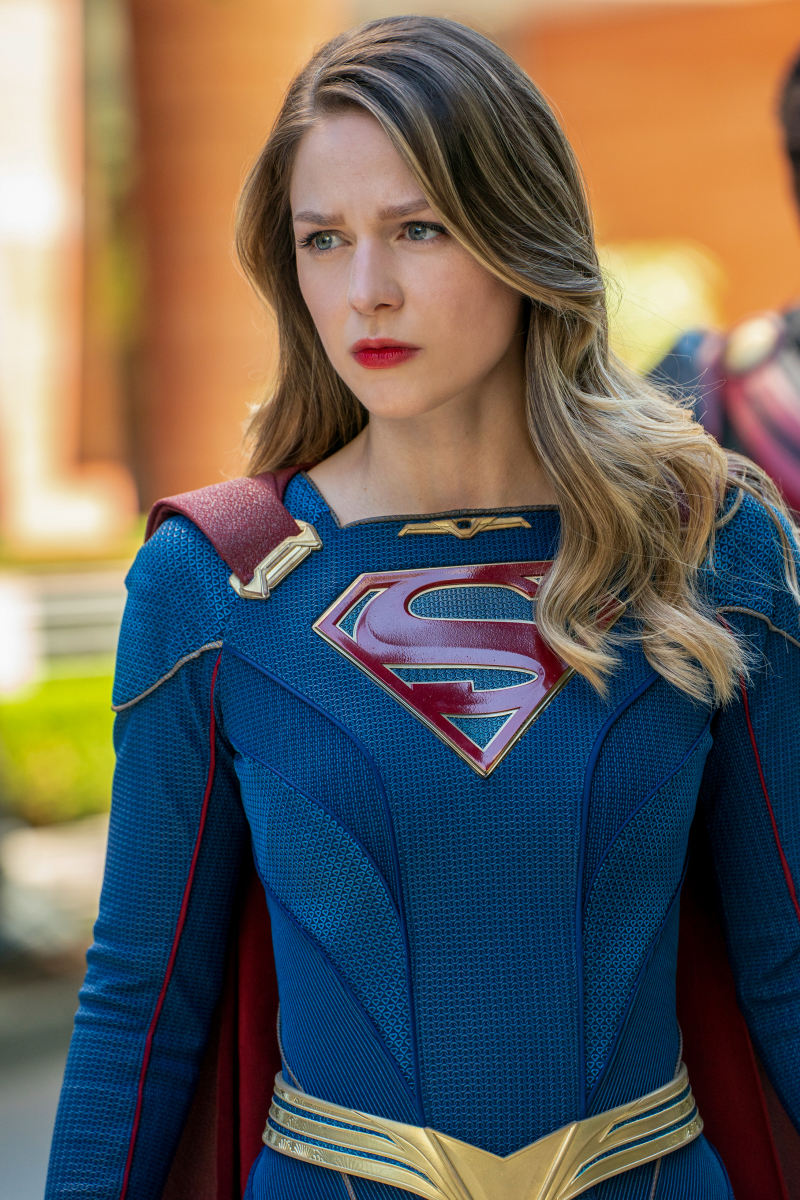
As Supergirl prepares to take her final bow tonight (November 9), we thought we would take this opportunity to look back at some other super finales from years past. Here is a look at how five shows starring Kara’s “more famous cousin” (as Barry Allen once called him) each wrapped up their run.
EDITOR’S NOTE: As there were many shows starring Super-people, this list is curated to big highlights and milestones, narrowed down to a Top 5. So, trust – nothing is “forgotten;” just only so much space!
——————–
THE ADVENTURES OF SUPERMAN
SERIES SUMMARY: The live-action heroics of Superman hit the small screen for the first time as George Reeves brought the character to life in black and white, alongside Phyllis Coates as Lois Lane, Jack Larson as Jimmy Olsen, and John Hamilton as Perry White. Starting with the second season, Noel Neill took over the role of Lois Lane. (She had previously played Lois alongside Kirk Alyn’s Superman in the serials of the late 1940s.) Later seasons were broadcast in color. Lex Luthor and the rest of Superman’s comic book rogues gallery were notably absent from this series, instead mostly pitting the Man of Steel against gangsters and mad scientists.
WHEN IT AIRED: 1952 – 1958
SERIES FINALE: “All That Glitters,” April 28th, 1958
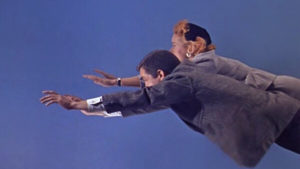 HOW IT ENDED: Professor Pepperwinkle has invented a machine that creates gold, making him a target for some crooks who want to steal his device. While investigating the professor’s invention, Lois and Jimmy are exposed to “Positive Kryptonite,” which gives them the same powers as Superman! This actually turns out to be a dream that Jimmy is having after getting hit on the head. Superman shows up in the last few minutes to defeat the crooks, and the professor agrees never to use his invention again. (It turns out it requires platinum to operate, which meant he was losing money in creating the gold.)
HOW IT ENDED: Professor Pepperwinkle has invented a machine that creates gold, making him a target for some crooks who want to steal his device. While investigating the professor’s invention, Lois and Jimmy are exposed to “Positive Kryptonite,” which gives them the same powers as Superman! This actually turns out to be a dream that Jimmy is having after getting hit on the head. Superman shows up in the last few minutes to defeat the crooks, and the professor agrees never to use his invention again. (It turns out it requires platinum to operate, which meant he was losing money in creating the gold.)
SATISFYING ENDING?: Not at all. This is a fun episode, but it’s pretty obvious this was not intended to be a series finale. Superman only appears in about three minutes of it, and the fact that most of it is just Jimmy’s dream is a bit odd. Still, it’s amusing to see Lois and Jimmy flying around like Superman usually would!
FUN FACT: This episode was directed by George Reeves, which may explain why he doesn’t have much screen time in the episode.
WHERE TO WATCH: All six seasons of “The Adventures of Superman” are available on DVD, and they are available for digital purchase on sites such as Amazon, Google Play, Apple TV, and Vudu.
——————–
SUPERBOY
SERIES SUMMARY: The adventures of Superman when he was a boy! “Superboy” got off to a rocky start with John Haymes Newton in the title role, a low budget, and some lackluster storylines in season one. Season two introduced a new leading man; Gerard Christopher took over the role of Clark Kent/Superboy. The later seasons of the show were particularly strong and featured scripts by comic book writers like Denny O’Neil, J.M. DeMatteis, Cary Bates, Mike Carlin, and Mark Evanier. Stacy Haiduk played Lana Lang for all four seasons of the show. The series also featured pretty faithful renditions of Superman villains like Metallo, Bizarro, and Mr. Mxyzptlk in live action for the first time.
WHEN IT AIRED: 1988 – 1992
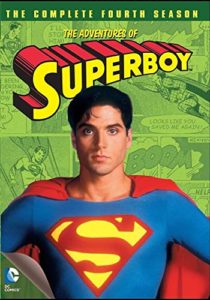 SERIES FINALE: “Rites of Passage,” part 1 and 2, May 10th and May 17th, 1992
SERIES FINALE: “Rites of Passage,” part 1 and 2, May 10th and May 17th, 1992
HOW IT ENDED: A message from Superboy’s spaceship is activated, letting him know he is ready for the next stage of his development. However, a crystal that was supposed to come with the ship is missing, and as a defensive measure Clark is stripped of his powers. Now, powerless, he must try to find the crystal and get his powers back – but he’s not the only one looking for it. Lana Lang, Matt Ritter, and C. Dennis Jackson from the Bureau of Extra-Normal Matters are all in Smallville looking for it as well, and Lana is closer than ever to figuring out that Clark and Superboy are one and the same. In the end, Clark finds the crystal first and restores his powers just in time to cast some doubt on his secret identity once more.
SATISFYING ENDING?: It’s not bad. The show stops just short of saying that Superboy has now become Superman with this “next stage of development.” It seems to be what they are implying, but it would have been better if they’d come right out and said that. Also, Lana comes very close to figuring out the secret only to have it be pulled out from under her once again. For the series finale, it would have been more satisfying if she finally got to learn the truth.
FUN FACT: The original plan was for the series to end with “Obituary for a Superhero,” killing off Superboy to be revived later in a spin-off movie. When it became clear that a movie would not be in the cards, “Obituary for a Superhero” was given a different ending with Superboy surviving and this new finale was written instead.
WHERE TO WATCH: All four seasons of “Superboy” are available on DVD, and they are available for digital purchase on sites such as Amazon, Apple TV, and Google Play.
——————–
LOIS & CLARK: THE NEW ADVENTURES OF SUPERMAN
SERIES SUMMARY: This show put the investigative reporting and will-they-or-won’t-they romantic escapades of the titular duo at the forefront, with superheroics generally taking a back seat. Dean Cain’s portrayal reflected the comic books of the time, taking a “Superman is what I can do, Clark is who I am” approach to the character. Teri Hatcher was a feisty and independent 90s woman as Lois Lane. The “love triangle with two people” concept lasted for a couple of seasons before finally letting Lois in on the secret in season three. Lois and Clark tied the knot in season four, in an event timed to coincide with their wedding in the comics.
WHEN IT AIRED: 1993 – 1997
SERIES FINALE: “The Family Hour,” June 14th, 1997
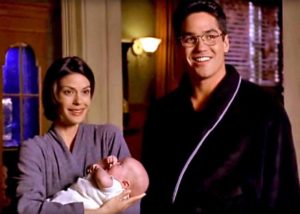 HOW IT ENDED: Lois and Clark are disappointed by the news that they are not able to have children. They ask Lois’s father, Dr. Sam Lane, for help – which involves them revealing to him that Clark is Superman. Unfortunately, a telekinetic villain known as Fat Head (Harry Anderson) has learned Superman’s secret identity as well, and he kidnaps Jonathan and Martha Kent and Sam and Ellen Lane to ensure that Superman won’t stop him from stealing millions of dollars in gold. Ultimately Fat Head is tricked into using a device which removes his powers and his knowledge of Superman’s identity, and also somehow Sam Lane’s knowledge of Superman’s identity as well. A cliffhanger ending has Lois and Clark finding a baby on their doorstep wrapped in a Superman blanket, with a note saying that the child belongs to them.
HOW IT ENDED: Lois and Clark are disappointed by the news that they are not able to have children. They ask Lois’s father, Dr. Sam Lane, for help – which involves them revealing to him that Clark is Superman. Unfortunately, a telekinetic villain known as Fat Head (Harry Anderson) has learned Superman’s secret identity as well, and he kidnaps Jonathan and Martha Kent and Sam and Ellen Lane to ensure that Superman won’t stop him from stealing millions of dollars in gold. Ultimately Fat Head is tricked into using a device which removes his powers and his knowledge of Superman’s identity, and also somehow Sam Lane’s knowledge of Superman’s identity as well. A cliffhanger ending has Lois and Clark finding a baby on their doorstep wrapped in a Superman blanket, with a note saying that the child belongs to them.
SATISFYING ENDING?: Not even close. Fat Head is one of the weirdest villains of the series (no offense to the late Harry Anderson, who seems to enjoy chewing the scenery here), and the plot just doesn’t live up to the drama of previous season finales, let alone a series finale. Having Lois’s dad learn Clark’s secret and then unlearn it in the span of an episode is a strange choice as well. This was obviously not intended to be the last episode of the series, as is evidenced by the cliffhanger with the baby, but even if you take that into consideration this is still one of the weaker entries in the entire series.
FUN FACT: Series writer and executive producer Brad Buckner revealed some details to KryptonSite about what the plans were for that baby… you can read about it here! https://www.kryptonsite.com/loisclark/buckner2003.htm
WHERE TO WATCH: All four seasons of “Lois & Clark” are included on HBO Max, in high-definition for the first time! The show is also available on DVD, as well as for digital purchase on sites such as Amazon, Google Play, Apple TV, and Vudu – although those versions are all standard definition at this time.
——————–
SUPERMAN: THE ANIMATED SERIES
SERIES SUMMARY: The creative team behind “Batman: The Animated Series” turned their attention to the Man of Steel in this series, which took a lot of visual inspiration from the Fleischer Brothers cartoons of the 1940s. Superman was voiced by Tim Daly, and Lois Lane by Dana Delany.
WHEN IT AIRED: 1996 – 2000
SERIES FINALE: “Legacy” part 1 and 2, February 5th and 12th, 2000
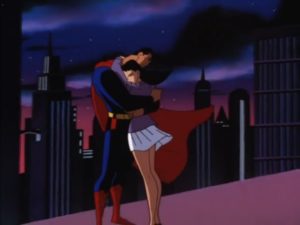 HOW IT ENDED: An epic two-part finale sees a subplot that had been simmering throughout the series pay off in a big way, as Darkseid (voice of Michael Ironside) takes control of Superman and forces him to lead an invasion of Earth. When Superman finally breaks free from the mind control he heads to Apokolips to settle the score with Darkseid, knowing he will have to unseat the despot once and for all. Upon returning to Earth after a brutal final battle, Superman finds that the world no longer trusts him – in fact, most people are now afraid of him.
HOW IT ENDED: An epic two-part finale sees a subplot that had been simmering throughout the series pay off in a big way, as Darkseid (voice of Michael Ironside) takes control of Superman and forces him to lead an invasion of Earth. When Superman finally breaks free from the mind control he heads to Apokolips to settle the score with Darkseid, knowing he will have to unseat the despot once and for all. Upon returning to Earth after a brutal final battle, Superman finds that the world no longer trusts him – in fact, most people are now afraid of him.
SATISFYING ENDING?: Darkly satisfying, but, yes – which is especially ironic considering the writers originally intended for this storyline to kick off a new season, not end the series. Superman gradually regaining the public trust would have been a storyline explored as the show went on. Instead, the final moments of the series have Lois and Superman share their first kiss, as Lois assures Superman that he will win everyone’s trust back “one person at a time.” We would see this version of Superman again in the “Justice League” animated series (voiced by George Newbern going forward), but at the time, as far as we knew, this was it.
FUN FACT: The climactic fight between Superman and Darkseid was storyboarded by Bruce Timm.
WHERE TO WATCH: “Superman: The Animated Series” is included on HBO Max, and was also just released as a series set on Blu-ray. It’s also available on DVD, as well as for digital purchase on sites such as Amazon, Google Play, Apple TV, and Vudu.
——————–
SMALLVILLE
SERIES SUMMARY: The series that started out as young Clark Kent by way of “Dawson’s Creek” would go on to give fans ten years of stories of a pre-Superman coming into his own, with a no-tights, no-flights policy strictly enforced for the majority of its run. Tom Welling played Clark, alongside Michael Rosenbaum as Lex Luthor, Kristin Kreuk as Lana Lang, and John Schneider and Annette O’Toole as Jonathan and Martha Kent. Erica Durance joined the series in its fourth season as the incomparable Lois Lane.
WHEN IT AIRED: 2001 – 2011
SERIES FINALE: “Finale” part 1 and 2, May 13th, 2011
HOW IT ENDED: Lois and Clark’s wedding day is approaching, but so is the planet Apokolips. Darkseid (who is more of a disembodied evil force here rather than a physical presence) has unleashed doom and gloom on the world, and on top of that Lex Luthor has just been resurrected. Clark finally accepts his destiny and dons the red-and-blue suit for the first time to go save the day – although not before his father reminds him to “always hold on to Smallville.” Superman flies up, up, and away… and physically pushes the entire planet Apokolips away from Earth, to much rejoicing.
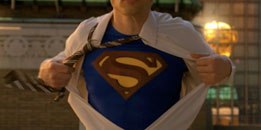 SATISFYING ENDING?: Some might disagree, but overall yes. Fan favorite Michael Rosenbaum came back to play Lex Luthor one more time, there are some great Clark and Lois moments as they get ready for their wedding, and there are lots of flashbacks as Clark embraces his powers. Some fans felt a bit cheated though by the fact that we don’t REALLY see Tom Welling in the famous super suit… all the Superman shots are done via CGI. Still, the “flash forward” in the last few minutes of the finale that shows us Lois, Clark, and the rest of the crew at the Daily Planet seven years later is hard not to geek out over, even after multiple viewings. The final shot of the series is the famous shirt-rip and “S” reveal, which seems only appropriate.
SATISFYING ENDING?: Some might disagree, but overall yes. Fan favorite Michael Rosenbaum came back to play Lex Luthor one more time, there are some great Clark and Lois moments as they get ready for their wedding, and there are lots of flashbacks as Clark embraces his powers. Some fans felt a bit cheated though by the fact that we don’t REALLY see Tom Welling in the famous super suit… all the Superman shots are done via CGI. Still, the “flash forward” in the last few minutes of the finale that shows us Lois, Clark, and the rest of the crew at the Daily Planet seven years later is hard not to geek out over, even after multiple viewings. The final shot of the series is the famous shirt-rip and “S” reveal, which seems only appropriate.
FUN FACT: Michael Rosenbaum filmed his scenes for the finale in a single day.
WHERE TO WATCH: All ten seasons of “Smallville” are included on Hulu, and the show was also just released as a series set on Blu-ray. It’s also available on DVD, as well for digital purchase on sites such as Amazon, Google Play, Apple TV, and Vudu.
——————–
The series finale of “Supergirl” will air on the CW on November 9th as a special two-hour event (see pictures here!). Fans are, of course, speculating about how the series will end. Will Kara fly off into the sunset to live happily ever after? Will she travel to the future to be with Mon-El and the Legion? Will she finally admit her true feelings for Lena? Could she possibly be de-powered, or even killed off? Given the interconnected nature of the Arrowverse shows, many fans hope that things will be left open-ended enough that we might see Supergirl again someday, perhaps on “Superman & Lois” or “The Flash,” if Melissa Benoist can be persuaded to don the tights and cape once more.
Back in the second season of “Supergirl,” in the episode “The Last Children of Krypton,” Kara says a Kryptonian phrase to her cousin Kal-El (Tyler Hoechlin) as the two say goodbye to each other. Winn asks what it means.
“There’s not really a word for it in your language,” Superman says. “I guess the closest thing would be… ‘to be continued’.”
A fitting reminder to fans as another super show leaves the airwaves. It’s not really goodbye, when these characters always remain ready to save the day in whatever incarnation comes next. After all, the fight for truth and justice is, as it always has been, a never-ending battle.
Many Faces
The Many Faces of Lois Lane – 2021 Edition
Russ Dimino looks at the many talented actresses who have played Lois Lane over the decades.
Published
4 years agoon
February 21, 2021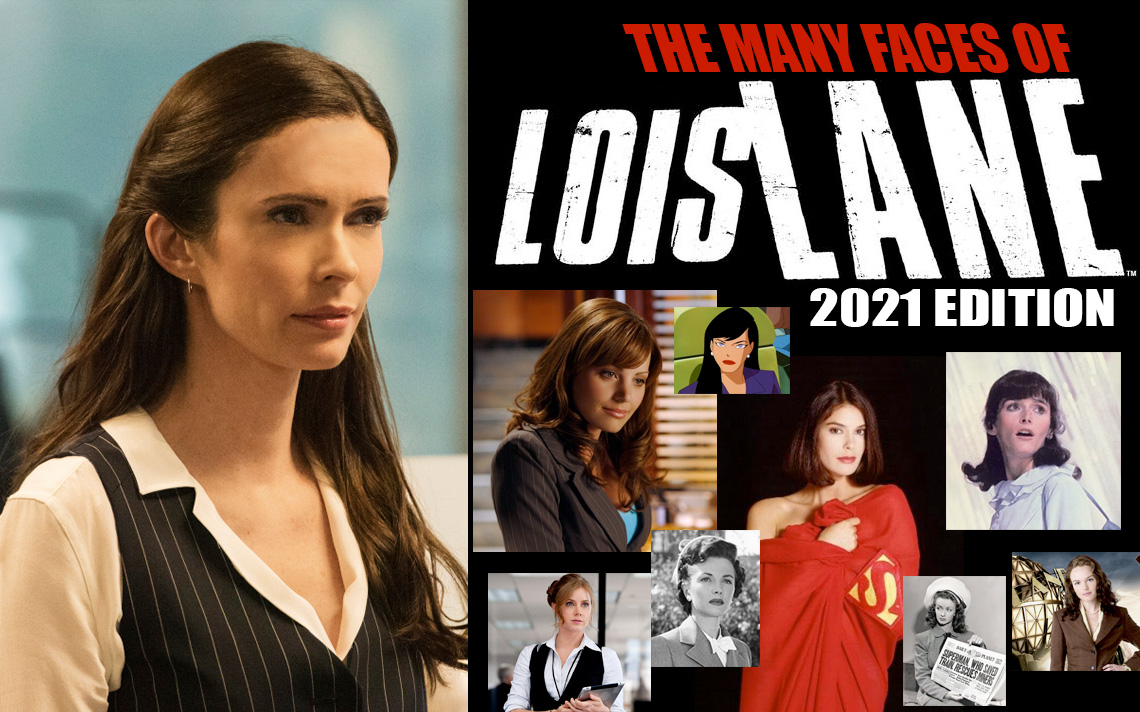
There are two things in this world that can make Superman weak in the knees. One is a green, glowing rock that just happens to be a radioactive chunk of his demolished home planet. The other is a feisty reporter with a nose for news and the initials L.L. For years, Clark Kent has tried to balance the fact that Superman belongs to the world with his desire to live a normal life with the woman of his dreams, Lois Lane.
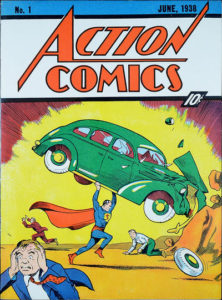 Lois was around from the very beginning – her first comic book appearance was the same as Superman’s. Miss Lane and the Man of Steel both made their debut in Action Comics #1 in June of 1938. Clark seemed to have a thing for Lois right away. He asked her on a date in that first issue!
Lois was around from the very beginning – her first comic book appearance was the same as Superman’s. Miss Lane and the Man of Steel both made their debut in Action Comics #1 in June of 1938. Clark seemed to have a thing for Lois right away. He asked her on a date in that first issue!
The first time that Lois was given life on screen it was in animated form, in the cartoon shorts that were originated by the Fleischer brothers in the early 1940s. The voices of both Lois Lane and Superman in these shorts were already familiar to audiences – Joan Alexander and Bud Collyer also voiced the characters on the popular radio show “The Adventures of Superman.”
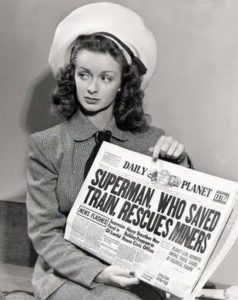 Audiences got their first two live-action Lois Lanes in a relatively short span of time. Noel Neill first played Lois in the Superman movie serials from 1948 to 1950, which starred Kirk Alyn. In 1951, George Reeves made his debut as Superman in “Superman and the Mole Men.” Here, Lois was played by Phyllis Coates. Phyllis continued the role for the first season of the “Adventures of Superman” TV series. After the inaugural season, Ms. Coates opted not to return, and Ms. Neill returned to the role of Lois for the remainder of the series.
Audiences got their first two live-action Lois Lanes in a relatively short span of time. Noel Neill first played Lois in the Superman movie serials from 1948 to 1950, which starred Kirk Alyn. In 1951, George Reeves made his debut as Superman in “Superman and the Mole Men.” Here, Lois was played by Phyllis Coates. Phyllis continued the role for the first season of the “Adventures of Superman” TV series. After the inaugural season, Ms. Coates opted not to return, and Ms. Neill returned to the role of Lois for the remainder of the series.
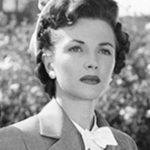 Coates and Neill offered very different portrayals of the Lois Lane character. The Phyllis Coates Lois was a much more hard-edged, no-nonsense reporter, and one of the very few versions who didn’t fall head over heels for the Man of Steel. When Neill resumed the role in 1953, her version of Lois was a much gentler one, who developed a friendship with Clark Kent and an attraction to our hero in blue.
Coates and Neill offered very different portrayals of the Lois Lane character. The Phyllis Coates Lois was a much more hard-edged, no-nonsense reporter, and one of the very few versions who didn’t fall head over heels for the Man of Steel. When Neill resumed the role in 1953, her version of Lois was a much gentler one, who developed a friendship with Clark Kent and an attraction to our hero in blue.
Not only did Neill star alongside both Alyn and Reeves, but she also made a cameo appearance in the 1978 “Superman” movie (she and Alyn played Lois Lane’s parents), an appearance on the “Superboy” TV series, and she had a small role in the movie “Superman Returns.” Phyllis Coates also got a chance to return to the Superman mythos when she appeared on “Lois and Clark” in 1994, playing Lois’s mother in the episode “House of Luthor.”
Next, Superman and Lois would get animated again, and Joan Alexander would return to the role that she’d played two decades earlier! Joan Alexander and Bud Collyer again voiced Lois and Clark during the 1966-1970 “New Adventures of Superman” series, as well as the 1967-68 “Superman/Aquaman Hour of Adventure.” Though Alexander was the primary Lois, Julie Bennett, the voice of Wonder Girl, stepped in as Lois on some episodes.
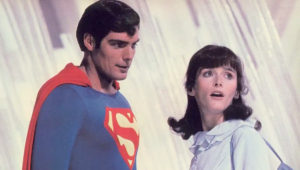 Then came the first big screen “Superman” movie in 1978, with Margot Kidder taking on the role of Lois Lane. Ms. Kidder seemed to combine the confident, no-nonsense reporter of Phyllis Coates with the swooning, doe-eyed girl of Noel Neill and make that combination somehow seem natural. Ms. Kidder was far from the only actress considered for the part. DVD and Blu-ray extras show screen tests of several other actresses who tried out, including Anne Archer, Deborah Raffin, Susan Blakely, Stockard Channing, and Lesley Ann Warren. (Ms. Warren did play Lois in a 1975 TV adaptation of the 1966 Broadway musical “It’s A Bird, It’s A Plane, It’s Superman”!) Christopher Reeve’s screen test is also included, with Holly Palance stepping in opposite him as Lois.
Then came the first big screen “Superman” movie in 1978, with Margot Kidder taking on the role of Lois Lane. Ms. Kidder seemed to combine the confident, no-nonsense reporter of Phyllis Coates with the swooning, doe-eyed girl of Noel Neill and make that combination somehow seem natural. Ms. Kidder was far from the only actress considered for the part. DVD and Blu-ray extras show screen tests of several other actresses who tried out, including Anne Archer, Deborah Raffin, Susan Blakely, Stockard Channing, and Lesley Ann Warren. (Ms. Warren did play Lois in a 1975 TV adaptation of the 1966 Broadway musical “It’s A Bird, It’s A Plane, It’s Superman”!) Christopher Reeve’s screen test is also included, with Holly Palance stepping in opposite him as Lois.
Kidder then returned for “Superman II” in 1980. This time out, Lois learned that Superman and Clark Kent were one and the same, and the two finally got together… at least until the end of the film, when Lois’s memory of the entire ordeal was erased with an amnesia-inducing super-kiss. An alternate cut of the film by its original director, Richard Donner, was released in 2006, and included a variation on the moment Lois discovers Clark’s secret; in a scene recreated from Reeve and Kidder’s screen tests, Lois Lane shoots Clark Kent to confirm that he’s invulnerable! (Clark doesn’t immediately realize the bullet was a blank.)
After a falling out with the producers, Kidder’s role in “Superman III” was dramatically reduced. Her screen time for the third installment is only about five minutes, while Annette O’Toole’s Lana Lang becomes Clark’s primary love interest for the film. By the time “Superman IV” came around in 1987, Kidder’s part was larger again, but she had to compete with Mariel Hemingway for Superman’s attention.
Ms. Kidder is yet another Lois Lane who returned for later installments of the Superman legend. The fourth season of “Smallville” featured two appearances by Kidder as Dr. Bridgette Crosby, emissary to Christopher Reeve’s Dr. Virgil Swann.
Lois made surprisingly few appearances on the many animated incarnations of “Super Friends” that aired throughout the 1970s and 80s, probably because the show tended to focus much more on superheroics than secret identities. She was voiced by Shannon Farnon, Mary McDonald Lewis, and Edna Mayo at various points throughout these shows. (Mary McDonald Lewis sounded quite a lot like Margot Kidder, which may have been a factor in her casting.)
When the Ruby Spears “Superman” cartoon came out in 1988, Lois’s voice was provided by Ginny McSwain. Ms. McSwain would go on to become the voice director for animated shows like “Spirit Riding Free,” “Transformers: Rescue Bots,” and “VeggieTales.”
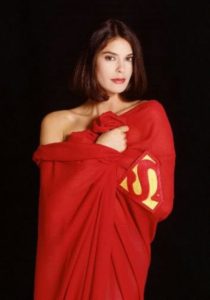 The next to take on the role was Teri Hatcher, who played Lois on “Lois & Clark” from 1993-97. This series emphasized the romance between Lois Lane and Clark Kent, with super-heroics taking a backseat to “will they or won’t they?,” at least for the first couple of seasons. Lois eventually falls for the farmboy and not just the hero in blue, and by the start of season three she’s in on the secret. During the show’s run, Teri received the honor of being the most downloaded woman on the internet, due in large part to a picture of her wrapped up in Superman’s cape and nothing else. Teri would go on to make guest appearances on “Smallville” (a brief cameo as the mother of Erica Durance’s Lois), and “Supergirl” (as Rhea, the mother of Mon-El).
The next to take on the role was Teri Hatcher, who played Lois on “Lois & Clark” from 1993-97. This series emphasized the romance between Lois Lane and Clark Kent, with super-heroics taking a backseat to “will they or won’t they?,” at least for the first couple of seasons. Lois eventually falls for the farmboy and not just the hero in blue, and by the start of season three she’s in on the secret. During the show’s run, Teri received the honor of being the most downloaded woman on the internet, due in large part to a picture of her wrapped up in Superman’s cape and nothing else. Teri would go on to make guest appearances on “Smallville” (a brief cameo as the mother of Erica Durance’s Lois), and “Supergirl” (as Rhea, the mother of Mon-El).
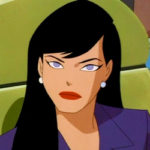 In 1996, Dana Delany voiced Lois for “Superman: The Animated Series.” No stranger to cartoon superheroes, Delany had voiced Andrea Beaumont, Bruce Wayne’s long-lost love, in “Batman: Mask of the Phantasm” just three years earlier. Ms. Delany continued to voice Lois throughout multiple appearances on Cartoon Network’s “Justice League” series. (Ms. Delany doesn’t hold the only voice credit for Lois for “S:TAS.” Mae Whitman provided the voice of a young Lois in a flashback scene, in the episode “Monkey Fun.”)
In 1996, Dana Delany voiced Lois for “Superman: The Animated Series.” No stranger to cartoon superheroes, Delany had voiced Andrea Beaumont, Bruce Wayne’s long-lost love, in “Batman: Mask of the Phantasm” just three years earlier. Ms. Delany continued to voice Lois throughout multiple appearances on Cartoon Network’s “Justice League” series. (Ms. Delany doesn’t hold the only voice credit for Lois for “S:TAS.” Mae Whitman provided the voice of a young Lois in a flashback scene, in the episode “Monkey Fun.”)
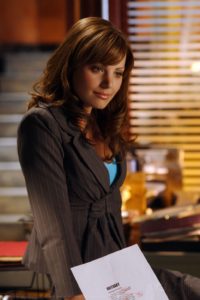 With the premiere of the fourth season of “Smallville” in 2004, Erica Durance made her first appearance as Lois Lane. (This mostly put to rest internet speculation that Allison Mack’s Chloe Sullivan would somehow evolve into the character, either via a penname or new witness-protection identity.) Originally scheduled to make only a handful of guest-appearances, Ms. Durance’s Lois proved popular enough with the fans that her role was expanded – first to 13 episodes, and then eventually to series regular. In an interesting twist, Lois is “in on the secret” before Clark actually becomes Superman, and in fact actually assists him in developing his mild-mannered secret identity throughout season 10. And yes, Erica Durance has also continued the tradition of returning to the world of heroes and capes in a “torch-passing” role: she has played Allura, Supergirl’s mother, in several episodes of the CW’s “Supergirl” beginning in season three.
With the premiere of the fourth season of “Smallville” in 2004, Erica Durance made her first appearance as Lois Lane. (This mostly put to rest internet speculation that Allison Mack’s Chloe Sullivan would somehow evolve into the character, either via a penname or new witness-protection identity.) Originally scheduled to make only a handful of guest-appearances, Ms. Durance’s Lois proved popular enough with the fans that her role was expanded – first to 13 episodes, and then eventually to series regular. In an interesting twist, Lois is “in on the secret” before Clark actually becomes Superman, and in fact actually assists him in developing his mild-mannered secret identity throughout season 10. And yes, Erica Durance has also continued the tradition of returning to the world of heroes and capes in a “torch-passing” role: she has played Allura, Supergirl’s mother, in several episodes of the CW’s “Supergirl” beginning in season three.
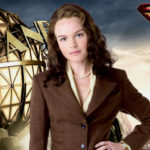 In 2006, Superman flew back to the screen in “Superman Returns,” Bryan Singer’s love letter to the Christopher Reeve films. Here, Kate Bosworth portrayed a Lois Lane who had seemingly moved on from Superman after his five-year absence from Earth; Superman came back to find that Lois was engaged to another man, and that she had a child. (Spoiler alert: The kid is actually Superman’s, a controversial plot-twist that left fans divided.)
In 2006, Superman flew back to the screen in “Superman Returns,” Bryan Singer’s love letter to the Christopher Reeve films. Here, Kate Bosworth portrayed a Lois Lane who had seemingly moved on from Superman after his five-year absence from Earth; Superman came back to find that Lois was engaged to another man, and that she had a child. (Spoiler alert: The kid is actually Superman’s, a controversial plot-twist that left fans divided.)
Starting in 2007, Warner Brothers began releasing a series of direct-to-video animated films based on the characters and storylines of DC Comics. Naturally, many of them are Superman stories, and include Lois Lane in some way, shape, or form.
-Anne Heche voiced Lois in 2007’s “Superman: Doomsday,” which was the studio’s first attempt at adapting the legendary Death of Superman storyarc from the comics.
-Kyra Sedgwick lent her voice to Lois in 2008’s “Justice League: The New Frontier,” adapted from Darwyn Cooke’s renowned mini-series.
-Christina Hendricks played Lois in the 2011 release of “All-Star Superman,” based on Grant Morrison and Frank Quitely’s mini-series of the same name.
-Grey DeLisle was the voice of Lois in 2012’s “Justice League: Doom,” a loose adaptation of Mark Waid’s “Tower of Babel” from the JLA comic books.
-Pauley Perrette provided Lois’s voice in 2012’s “Superman vs. The Elite,” an adaptation of Joe Kelly’s story “What’s So Funny About Truth, Justice, and The American Way?” from Action Comics #775.
-Stana Katic was the voice of Lois in 2013’s “Superman: Unbound,” which adapted a Brainiac story by Geoff Johns and Gary Frank. (This film also featured Katic’s “Castle” co-star, Molly Quinn, as the voice of Supergirl.)
-Dana Delaney once again lent her voice to the role of Lois Lane for 2013’s “Justice League: The Flashpoint Paradox,” which was an adaptation of the “Flashpoint” mini-series.
-Paget Brewster was the voice of Lois for 2015’s “Justice League: Gods and Monsters,” an original story about a decidedly darker version of the classic DCU characters.
-Rebecca Romijn voiced Lois in 2018’s “The Death of Superman,” the second animated adaptation of the titular comic book story. She reprised the role for 2019’s follow-up, “Reign of the Supermen,” as well as for Lois’s appearance in “Batman: Hush” the same year, and “Justice League Dark: Apokolips War” in 2020.
-Amy Acker was the voice of Lois in 2020’s “Superman: Red Son,” an adaptation of Mark Millar’s mini-series about a Superman who landed in Russia instead of Kansas.
-Alexandra Daddario provided the voice of Lois in 2020’s “Superman: Man of Tomorrow,” a retelling of the early years of Superman’s adventures.
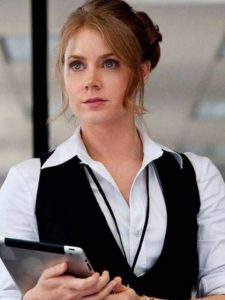 In 2013, Amy Adams portrayed Lois in the movie “Man of Steel.” In this version more than any other we got to see what an intrepid reporter Lois Lane truly is, as she tracked down Clark Kent and uncovered his secret before he ever even made a public appearance in the tights and cape. In an interview with the New York Daily News, Amy Adams revealed that this was not the first time she’d auditioned for the part of Lois. She also tried out for the role for “Superman: Flyby” (Brett Ratner’s Superman movie that never came to fruition) and “Superman Returns.” At the time that “Man of Steel” came out, Amy Adams was arguably best known for her role as live-action Disney princess Giselle in the movie “Enchanted,” but hardcore Superman fans may have recognized her from something else: she played fat-sucking meteor freak Jodi Melville in an early episode of “Smallville!” (Not something that this Academy Award nominee likely touts on her resume.) Ms. Adams reprised the role of Lois for 2016’s “Batman v Superman: Dawn of Justice” and 2017’s “Justice League.” We will undoubtedly get to see much more of her portrayal of Lois when Zack Snyder’s four-hour cut of “Justice League” is released on HBO Max in March 2021.
In 2013, Amy Adams portrayed Lois in the movie “Man of Steel.” In this version more than any other we got to see what an intrepid reporter Lois Lane truly is, as she tracked down Clark Kent and uncovered his secret before he ever even made a public appearance in the tights and cape. In an interview with the New York Daily News, Amy Adams revealed that this was not the first time she’d auditioned for the part of Lois. She also tried out for the role for “Superman: Flyby” (Brett Ratner’s Superman movie that never came to fruition) and “Superman Returns.” At the time that “Man of Steel” came out, Amy Adams was arguably best known for her role as live-action Disney princess Giselle in the movie “Enchanted,” but hardcore Superman fans may have recognized her from something else: she played fat-sucking meteor freak Jodi Melville in an early episode of “Smallville!” (Not something that this Academy Award nominee likely touts on her resume.) Ms. Adams reprised the role of Lois for 2016’s “Batman v Superman: Dawn of Justice” and 2017’s “Justice League.” We will undoubtedly get to see much more of her portrayal of Lois when Zack Snyder’s four-hour cut of “Justice League” is released on HBO Max in March 2021.
In early 2018, plans were announced for a “Metropolis” series that would have centered largely around a pre-Superman-era Lois Lane and Lex Luthor, which would have premiered on the DC Universe streaming service. The series never came to fruition, and never even got as far as the casting stage.
Speaking of the DC Universe, Lois made an appearance on the animated “Harley Quinn” series on the streaming service – voiced by Natalie Morales.
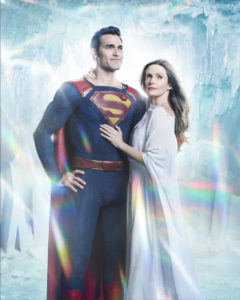 The CW series “Supergirl” had made occasional references to Lois Lane throughout its first few seasons, but it was not until the Arrowverse “Elseworlds” crossover event in December 2018 that she finally made her first appearance there. Elizabeth Tulloch (who often goes by Bitsie Tulloch), known for her role on the TV series “Grimm,” became the latest actress to bring Lois Lane to life on television. Promotional images of Bitsie’s Lois and Tyler Hoechlin’s Superman in the Fortress of Solitude gave off a strong “Superman II” vibe.
The CW series “Supergirl” had made occasional references to Lois Lane throughout its first few seasons, but it was not until the Arrowverse “Elseworlds” crossover event in December 2018 that she finally made her first appearance there. Elizabeth Tulloch (who often goes by Bitsie Tulloch), known for her role on the TV series “Grimm,” became the latest actress to bring Lois Lane to life on television. Promotional images of Bitsie’s Lois and Tyler Hoechlin’s Superman in the Fortress of Solitude gave off a strong “Superman II” vibe.
Bitsie’s Lois appeared again in the following year’s crossover event, “Crisis on Infinite Earths.” Since it brought together heroes from across the multiverse, this event allowed Bitsie the opportunity to share the screen with multiple Supermen. She shared a great scene with Brandon Routh talking about hope, and a quick moment with Tom Welling where she compares him to “the buff guy on the paper towel rolls.” We also saw Erica Durance briefly reprise her role as Lois Lane in the crossover as well, in addition to playing Allura.
Fans will soon get to see more of Bitsie’s Lois on a weekly basis, as she, along with Tyler Hoechlin’s Clark, star in their own series, “Superman and Lois,” premiering on the CW on February 23rd. The series will explore something that has only been seen or teased in small doses throughout the long legacy of these characters – Clark and Lois as parents. The show centers around the super-couple raising two boys, Jonathan and Jordan, in Clark’s hometown of Smallville, Kansas.
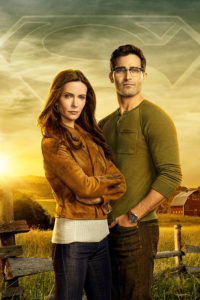 In September of 2018, Bitsie Tulloch posted on Instagram an image of her casting announcement, accompanied by a long, heartfelt caption describing how much the role of Lois Lane means to her. “As far back as 1938 when she first appeared in Action Comics #1, Lois Lane has defied and subverted society’s expectations of how women should behave,” Bitsie wrote. “She was portrayed as opinionated, inquisitive, and an unapologetically badass career woman at a time when many representations of women leaned more towards meek and demure. One of the reasons the character has remained so compelling for the last 80 years is that she has all these formidable, strong-willed qualities, but she’s also vulnerable, romantic, and feminine. A truly modern woman.” Certainly, Ms. Tulloch hit the nail on the head with that description of why Lois has captured the hearts of readers, movie-goers, and even the Man of Steel himself. Even though Superman can stop bullets and leap tall buildings, it’s Lois who has proven to be the greatest adventure for our hero. Right from the start, she caught the attention of one of the most powerful men in the universe, and he’s been flying after her ever since. No matter who has stepped into the role over the years, there has always been one enduring and endearing quality about Lois Lane… she is the one who gives Superman his humanity, because his dream for a normal life as Clark Kent only makes sense with her by his side.
In September of 2018, Bitsie Tulloch posted on Instagram an image of her casting announcement, accompanied by a long, heartfelt caption describing how much the role of Lois Lane means to her. “As far back as 1938 when she first appeared in Action Comics #1, Lois Lane has defied and subverted society’s expectations of how women should behave,” Bitsie wrote. “She was portrayed as opinionated, inquisitive, and an unapologetically badass career woman at a time when many representations of women leaned more towards meek and demure. One of the reasons the character has remained so compelling for the last 80 years is that she has all these formidable, strong-willed qualities, but she’s also vulnerable, romantic, and feminine. A truly modern woman.” Certainly, Ms. Tulloch hit the nail on the head with that description of why Lois has captured the hearts of readers, movie-goers, and even the Man of Steel himself. Even though Superman can stop bullets and leap tall buildings, it’s Lois who has proven to be the greatest adventure for our hero. Right from the start, she caught the attention of one of the most powerful men in the universe, and he’s been flying after her ever since. No matter who has stepped into the role over the years, there has always been one enduring and endearing quality about Lois Lane… she is the one who gives Superman his humanity, because his dream for a normal life as Clark Kent only makes sense with her by his side.
Many Faces
The Many Faces of Mxyzptlk (2020 Update)
With Thomas Lennon taking over the role of Mxyzptlk for Supergirl Episode 100, Russ Dimino looks back at the other actors to play the role!
Published
5 years agoon
February 23, 2020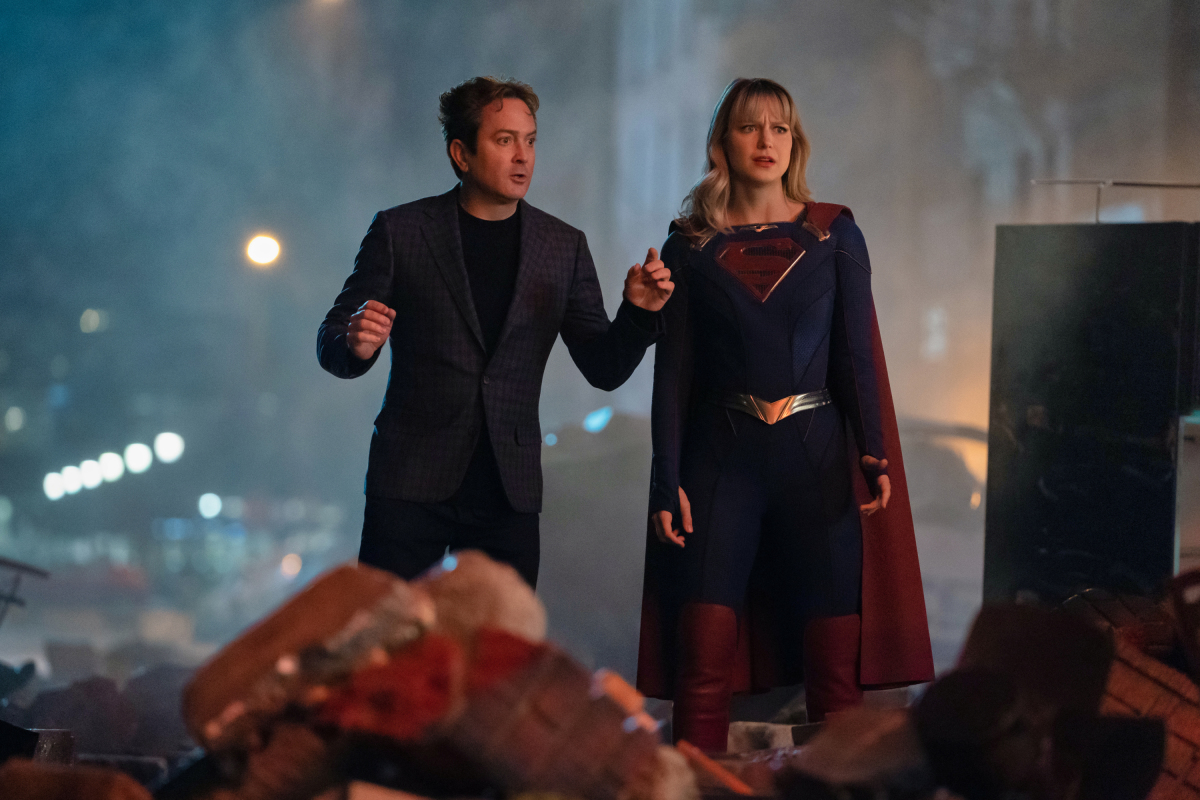
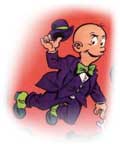
Superman has faced many enemies throughout the years. Some have challenged him on a physical level, some on a mental level. There is one foe, however, who has challenged his patience more than anything else. The mischievous imp from the 5th Dimension known as Mr. Mxyzptlk has annoyed, confounded and confused the Man of Steel for decades, usually in the name of a good laugh. This magical prankster can appear on Earth once every 90 days, playing jokes and causing trouble on an epic scale until Superman can outsmart him (which usually involves tricking him into saying his name backwards) and send him back to his own dimension. Sound crazy? That’s exactly the point.
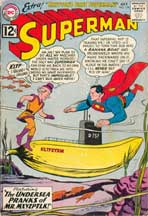 Mxy first appeared in Superman #30 in 1944, in a tale written by Superman co-creator Jerry Siegel. Initially spelled “Mxyztplk” (note the “t” and “p” are reversed), this first story had the imp bringing a nude statue to life, causing the mayor to bray like a donkey, and setting circus animals loose in the streets. The issue ended with a note asking fans to write in if they wanted to see more of Mr. Mxyztplk.
Mxy first appeared in Superman #30 in 1944, in a tale written by Superman co-creator Jerry Siegel. Initially spelled “Mxyztplk” (note the “t” and “p” are reversed), this first story had the imp bringing a nude statue to life, causing the mayor to bray like a donkey, and setting circus animals loose in the streets. The issue ended with a note asking fans to write in if they wanted to see more of Mr. Mxyztplk.
The “Adventures of Superman” TV series in the 1950s didn’t involve many supervillains from the Man of Steel’s rogues gallery, opting instead to put George Reeves’ Superman up against gangsters and mad scientists. It’s no surprise then that they didn’t include Mr. Mxyzptlk. The closest they came was a diminutive alien with otherworldly powers called Mr. Zero who appeared in the show’s fifth season. Could the show’s creators have been drawing some inspiration from Mxy with this character? It’s certainly possible. Mr. Zero was played by Billy Curtis, who had also played one of the Mole Men in “Superman and the Mole Men” a few years prior. Billy Curtis was also the man beneath the mask playing the lead role of Bark Bent / Superpup in “The Adventures of Superpup” pilot! (And if you don’t know what that is… don’t ask!)
The first animated adaptation of Mr. Mxyzptlk came in 1966, in “The New Adventures of Superman” episode titled “Imp-Practical Joker.” In this episode, Mr. Mxyzptlk takes over a carnival and has some fun with the Man of Steel. Since this was the first time the character was officially adapted into another medium, it has the notable distinction of being the first official attempt at pronouncing his name! It was pronounced here as something like “mix-yez-PITTLE-ik.” Mxyzptlk was voiced here by voice actor Gilbert Mack.
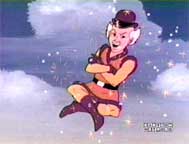 Mr. Mxyzptlk made several animated appearances throughout the various “Super Friends” series that spanned from 1977 – 1986, in such episodes as “Mr. Mxyzptlk and the Magic Lamp,” “Mxyzptlk Strikes Again,” and “Uncle Mxyzptlk” (which featured Red Kryptonite turning Superman into a little kid!). Voice actor Frank Welker provided the voice of Mxyzptlk, as well as several other characters in the series. The prolific Welker has voiced hundreds of cartoon characters throughout his amazing career, with roles ranging from Kermit on “Muppet Babies” and Abu the monkey in “Aladdin” to Dr. Claw on “Inspector Gadget” and Megatron on “Transformers.”
Mr. Mxyzptlk made several animated appearances throughout the various “Super Friends” series that spanned from 1977 – 1986, in such episodes as “Mr. Mxyzptlk and the Magic Lamp,” “Mxyzptlk Strikes Again,” and “Uncle Mxyzptlk” (which featured Red Kryptonite turning Superman into a little kid!). Voice actor Frank Welker provided the voice of Mxyzptlk, as well as several other characters in the series. The prolific Welker has voiced hundreds of cartoon characters throughout his amazing career, with roles ranging from Kermit on “Muppet Babies” and Abu the monkey in “Aladdin” to Dr. Claw on “Inspector Gadget” and Megatron on “Transformers.”
Did you know Mxyzptlk was almost in “Superman III”? In 1980, Ilya Salkind, one of the producers of the Christopher Reeve “Superman” films, wrote a treatment for the third installment of the franchise that was very different from what ultimately ended up on screen. Though some elements from this outline are present in the final film (i.e. Lana Lang, and the fact that Superman’s personality is altered to make him violent and destructive), Salkind’s version also included not only Mr. Mxyzptlk, but Brainiac and Supergirl as well! Superman and Supergirl would not have been cousins in this version; in fact, they fall in love! Though this version never got to the casting process (we were four years away from Helen Slater as Supergirl), Dudley Moore was reportedly the top choice for Mr. Mxyzptlk. You can read the full treatment at http://meatfighter.com/superman3/part4/s3_original_idea.pdf if you are so inclined. It’s an interesting read, to be sure!
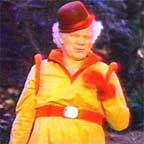 Mxy then popped up on the live-action “Superboy” TV series, which aired from 1988- 1992. In the first season episode “Meet Mr. Mxyzptlk,” Superboy removes a magic totem pole from the ground and accidentally opens a gateway to another dimension, releasing Mxyzptlk. The imp uses his magic to steal Lana Lang away from the Boy of Steel. Michael J. Pollard played Mxyzptlk, and his visual appearance was straight from the comics, right down to his purple bowler hat. Pollard reprised the role in season two, in the episode “Mr. and Mrs. Superboy.” Mr. Pollard passed away last year at the age of 80.
Mxy then popped up on the live-action “Superboy” TV series, which aired from 1988- 1992. In the first season episode “Meet Mr. Mxyzptlk,” Superboy removes a magic totem pole from the ground and accidentally opens a gateway to another dimension, releasing Mxyzptlk. The imp uses his magic to steal Lana Lang away from the Boy of Steel. Michael J. Pollard played Mxyzptlk, and his visual appearance was straight from the comics, right down to his purple bowler hat. Pollard reprised the role in season two, in the episode “Mr. and Mrs. Superboy.” Mr. Pollard passed away last year at the age of 80.
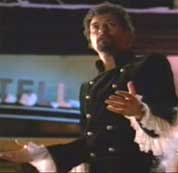 On “Lois & Clark,” Howie Mandel portrayed Mr. Mxyzptlk in the fourth season episode “Twas the Night Before Mxymas.” In this Christmas-themed tale, Mxy created a time loop that trapped Superman in the same day, but with hope and good cheer giving way to gloom and despair with each cycle. Mandel shares a few credits with his Mxyz predecessor Frank Welker, as Mandel also lent his voice to the “Muppet Babies,” playing Animal and Skeeter. He was also the voice of Bobby on “Bobby’s World,” while Welker provided the voice of Roger the Dog. Howie is probably best known to today’s audiences as a host of such shows as “America’s Got Talent” and “Deal or No Deal.”
On “Lois & Clark,” Howie Mandel portrayed Mr. Mxyzptlk in the fourth season episode “Twas the Night Before Mxymas.” In this Christmas-themed tale, Mxy created a time loop that trapped Superman in the same day, but with hope and good cheer giving way to gloom and despair with each cycle. Mandel shares a few credits with his Mxyz predecessor Frank Welker, as Mandel also lent his voice to the “Muppet Babies,” playing Animal and Skeeter. He was also the voice of Bobby on “Bobby’s World,” while Welker provided the voice of Roger the Dog. Howie is probably best known to today’s audiences as a host of such shows as “America’s Got Talent” and “Deal or No Deal.”
 Gilbert Gottfried was the next to give voice to Mr. Mxyzptlk, on “Superman The Animated Series” in 1997. The character first appeared in the episode “Mxyzpixilated,” which was based very heavily on the initial Jerry Siegel story from Superman #30. Mxy later returned and teamed with Bizarro in the episode “Little Big Head Man.” Other screen credits for Mr. Gottfried include Mr. Peabody in the “Problem Child” movies, and some episodes of “Crank Yankers.” His distinctive yell was also the voice of the Aflac duck for quite some time. And he also has a tie to Frank Welker… Gottfried voiced Iago the parrot in “Aladdin.” Gottfried has reprised the role of Mxyzptlk in episodes of “Justice League Action” as well as in a couple of video games.
Gilbert Gottfried was the next to give voice to Mr. Mxyzptlk, on “Superman The Animated Series” in 1997. The character first appeared in the episode “Mxyzpixilated,” which was based very heavily on the initial Jerry Siegel story from Superman #30. Mxy later returned and teamed with Bizarro in the episode “Little Big Head Man.” Other screen credits for Mr. Gottfried include Mr. Peabody in the “Problem Child” movies, and some episodes of “Crank Yankers.” His distinctive yell was also the voice of the Aflac duck for quite some time. And he also has a tie to Frank Welker… Gottfried voiced Iago the parrot in “Aladdin.” Gottfried has reprised the role of Mxyzptlk in episodes of “Justice League Action” as well as in a couple of video games.
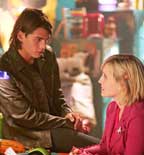 In the fourth season of “Smallville,” Mxyzptlk appeared not as an imp from the 5th dimension but as a foreign exchange student with verbal mind control powers. Mikhail Mxyzptlk appeared in the episode titled “Jinx,” running a sports gambling racket. He would influence the outcome of games by causing the players to fumble or trip via his spoken suggestions. The episode ended with a de-powered Mikhail being taken to Lex Luthor’s mysterious Level 33.1. (He did not appear again, though the Level 33.1 subplot would pay off several seasons later.) Mikhail Mxyzptlk was played by Trent Ford, who later appeared on “The Class” and “The Vampire Diaries.”
In the fourth season of “Smallville,” Mxyzptlk appeared not as an imp from the 5th dimension but as a foreign exchange student with verbal mind control powers. Mikhail Mxyzptlk appeared in the episode titled “Jinx,” running a sports gambling racket. He would influence the outcome of games by causing the players to fumble or trip via his spoken suggestions. The episode ended with a de-powered Mikhail being taken to Lex Luthor’s mysterious Level 33.1. (He did not appear again, though the Level 33.1 subplot would pay off several seasons later.) Mikhail Mxyzptlk was played by Trent Ford, who later appeared on “The Class” and “The Vampire Diaries.”
In 2011, Mr. Mxyzptlk made a brief appearance on “Batman: The Brave and the Bold” in the episode titled “Battle of the Superheroes.” Batman and Superman confront Mxy as he is using his magic to cause mayhem in Metropolis, and Superman tricks him into saying his name backwards via a knock-knock joke. Mxyzptlk is voiced here by Kevin Michael Richardson. Richardson had previously voiced The Joker on the 2004 series “The Batman,” among many other voice roles.
In late 2013, reports began circulating that Ben Affleck (who had been just recently cast as Batman) wanted his friend Larry David to play Mr. Mxyzptlk in the live-action DC film universe. While it’s unlikely that the mischievous imp’s brand of humor would have fit in very well with the decidedly dark “Batman vs. Superman,” it’s hard to deny that Larry David (“Curb Your Enthusiasm”) as Mxy would be, as he would say, “pretty, pretty, pretty good!”
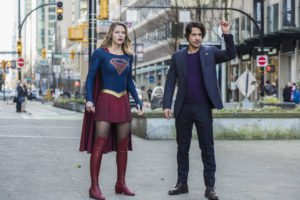 We would next find Mr. Mxyzptlk popping into the dimension of CW’s “Supergirl,” appearing in the closing moments of the 2017 episode titled “Luthors” and professing his love for Kara Zor-El. This cameo led to a full appearance in the following episode, “Mr. and Mrs. Mxyzptlk.” (A callback to the “Superboy” episode title, perhaps?) Upon finding that Supergirl didn’t reciprocate his romantic feelings, Mxy began conjuring up chaos to both challenge and impress the Girl of Steel. This version of Mxy was played by Peter Gadiot, who previously played Cyrus on “Once Upon a Time in Wonderland.”
We would next find Mr. Mxyzptlk popping into the dimension of CW’s “Supergirl,” appearing in the closing moments of the 2017 episode titled “Luthors” and professing his love for Kara Zor-El. This cameo led to a full appearance in the following episode, “Mr. and Mrs. Mxyzptlk.” (A callback to the “Superboy” episode title, perhaps?) Upon finding that Supergirl didn’t reciprocate his romantic feelings, Mxy began conjuring up chaos to both challenge and impress the Girl of Steel. This version of Mxy was played by Peter Gadiot, who previously played Cyrus on “Once Upon a Time in Wonderland.”
Mxy made his return to “Supergirl” this season much the same way he did previously, with a quick cameo just before the credits rolled on last week’s “Back From The Future, Part Two.” With this week’s episode, the series’ landmark 100th, Mxy will provide Kara with a glimpse into some possible alternative versions of her own history if she had made some different choices along the way. Thomas Lennon, a comedic actor known for a reboot of “The Odd Couple,” “Reno 911!” and MTV’s “The State,” is portraying Mxy this time around. (Whether his change in appearance is attributed to his magical nature or some kind of fallout from Crisis is almost certain to be addressed at some point.)
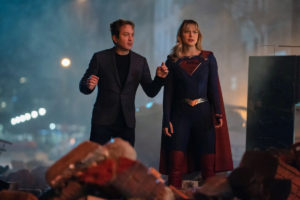 The thing that fans seem to love about Mxyzptlk is the sense of fun that he adds to any story that he appears in. Because his powers are magical in nature and his personality is so wild and unpredictable, fans know that all bets are off and anything can happen. Superman’s other foes may be able to trade punches with him or plan elaborate schemes, but Mxy can literally turn his world upside down with a wave of his hand. That playful mischief and sense of wonder was what got fans to respond to the query at the end of Superman #30, and that’s the same thing that keeps them coming back for more today.
The thing that fans seem to love about Mxyzptlk is the sense of fun that he adds to any story that he appears in. Because his powers are magical in nature and his personality is so wild and unpredictable, fans know that all bets are off and anything can happen. Superman’s other foes may be able to trade punches with him or plan elaborate schemes, but Mxy can literally turn his world upside down with a wave of his hand. That playful mischief and sense of wonder was what got fans to respond to the query at the end of Superman #30, and that’s the same thing that keeps them coming back for more today.
Mxyzptlk returns in Supergirl Episode 100 TONIGHT (Feb. 23, 2020) at 9PM ET/PT on The CW!

Superman Soars In New 2025 Movie Preview

Revealed: Possible Smallville Cameos in James Gunn’s Superman!

Smallville Animated Update: It May Be A While…

John Schneider Added To Salute to Smallville 2025 in Chicago!

Annette O’Toole’s Big Smallville Regret

Official Superman 2025 Movie Merch Hits The DC Shop, Hot Topic & More

Superman & Lois SERIES FINALE Images & Description: “It Went By So Fast”

Superman & Lois “A Regular Guy” Images & Official Description

Superman & Lois “Sharp Dressed Man” Photos & Description

Superman & Lois “To Live and Die Again” Photos Released
Trending
-
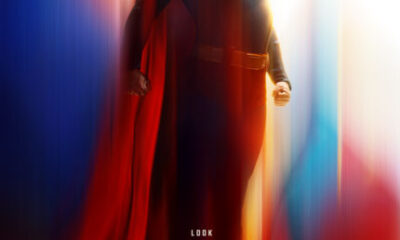
 Superman4 months ago
Superman4 months agoOfficial Superman 2025 Movie Merch Hits The DC Shop, Hot Topic & More
-
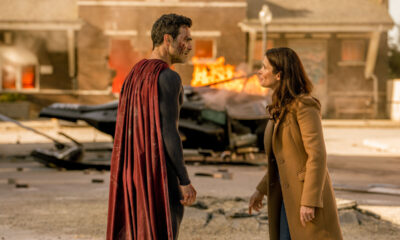
 Images4 months ago
Images4 months agoSuperman & Lois SERIES FINALE Images & Description: “It Went By So Fast”
-
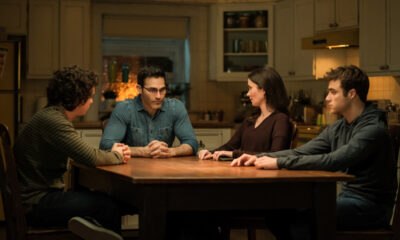
 Images5 months ago
Images5 months agoSuperman & Lois “A Regular Guy” Images & Official Description
-
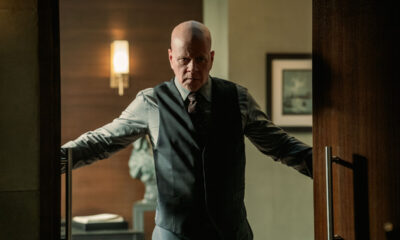
 Images5 months ago
Images5 months agoSuperman & Lois “Sharp Dressed Man” Photos & Description
-
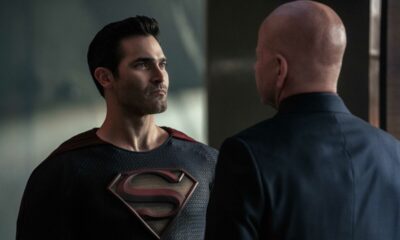
 Images5 months ago
Images5 months agoSuperman & Lois “To Live and Die Again” Photos Released
-
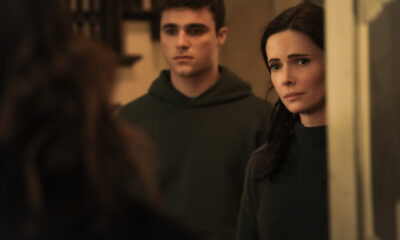
 Images6 months ago
Images6 months agoInterview: Bitsie Tulloch Previews “Always My Hero” and Superman & Lois Season 4
-

 Images7 months ago
Images7 months agoSuperman & Lois #4.2 Photos: “A World Without”
-
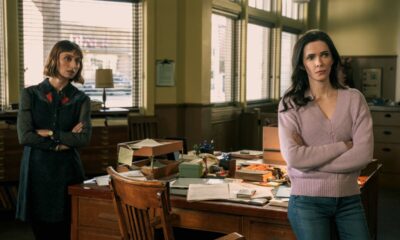
 Images6 months ago
Images6 months agoSuperman & Lois #4.4 “A Perfectly Good Wedding” Photos Released

